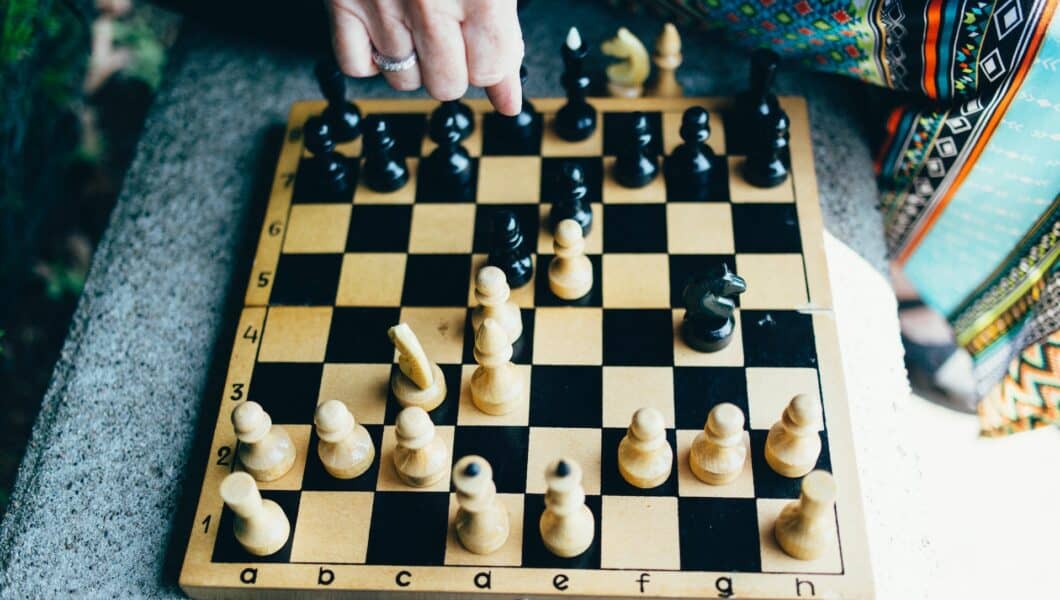A 2000 ELO rating in chess represents a strong club player who has a solid understanding of the game and is able to play at a competitive level. Achieving a 2000 ELO rating typically requires a significant amount of study and practice, as well as a strong foundation in chess fundamentals.
Here are some tips for working towards a 2000 ELO rating:
- Study chess fundamentals: Make sure you have a solid foundation in the basic principles of chess, such as opening principles, tactical motifs, and endgame techniques. This will help you make better decisions in your games and avoid common mistakes.
- Analyze your games: Take the time to analyze your own games to identify mistakes, missed opportunities, and areas for improvement. Use a chess engine to help you identify the critical moments in the game and the best moves you could have played.
- Play against stronger opponents: Playing against stronger opponents will help you improve your game faster. Look for opportunities to play in tournaments or online against players with a higher ELO rating than you.
- Learn from the masters: Study the games of the top chess players to learn new strategies and techniques. Pay attention to their thought processes and decision-making in different types of positions.
- Solve tactical puzzles: Practice solving tactical puzzles regularly to improve your pattern recognition and calculation skills. This will help you spot combinations and tactics in your games more easily.
- Play different types of positions: Try to play a variety of positions, including closed, open, tactical, and positional. This will help you develop a well-rounded understanding of the game and improve your ability to adapt to different situations.
- Focus on your weaknesses: Identify your weaknesses and work on them systematically. For example, if you struggle with endgames, spend more time studying and practicing them until you become more comfortable with them.
- Practice regularly: Play games regularly to gain experience and improve your skills. Analyze your games to identify mistakes and areas for improvement.
- Manage your time: Time management is crucial in chess, especially in faster time controls. Practice playing with a clock and learn to manage your time efficiently to avoid losing on time or making rushed decisions.
- Stay focused and motivated: Chess can be a mentally challenging game, and it’s important to stay focused and motivated. Set realistic goals for yourself, celebrate your achievements, and learn from your setbacks.
- Get a coach: A chess coach can provide personalized guidance and help you identify areas for improvement that you may not be aware of. They can also provide feedback on your games and help you develop a training plan that fits your specific needs and goals.
Study Plans to Reach 2000 Rating in Chess Within 6 Months
- Focus on the endgame: Study endgame principles and practice endgame positions regularly.
- Solve tactical puzzles: Solve puzzles that involve tactics and combinations to improve your calculation skills.
- Analyze your games: Review your own games to identify your mistakes and learn from them.
- Study master games: Study games played by top-level players to learn from their strategies and tactics.
- Work on openings: Choose a few openings to study in-depth and develop a repertoire that you are comfortable with.
- Play long games: Play games with longer time controls to allow yourself time to think and analyze.
- Seek feedback: Get feedback from stronger players/a coach to identify areas of improvement and work on them.
To make significant progress, a daily commitment of approximately three hours is recommended. Here is a breakdown of how you can utilize this time:
- Solving Tactics: 60 mins
- Working on Openings and building a repertoire: 30 mins
- Studying Strategy: 30 mins
- Play long games with deep self analysis after you finish the game: 50 mins
- Study 1 Master Classic Game: 10 mins or you can study 1 game per week
How much time is typically required to attain a 2000 ELO rating in chess?
The amount of time it takes to reach a 2000 ELO chess rating can vary greatly depending on several factors, such as:
- Starting point: If you’re a complete beginner, it may take several years of consistent practice and study to reach a 2000 ELO rating. However, if you already have some experience and a solid foundation, you may be able to reach this level in a shorter amount of time.
- Training intensity: The amount of time and effort you put into training and studying chess will also affect how quickly you improve. Those who train intensively and consistently are likely to improve faster than those who only study sporadically.
- Natural aptitude: Some people may have a natural aptitude for chess and be able to improve quickly, while others may require more time and effort to reach the same level.
- Opportunities to play: Regular opportunities to play in tournaments or against strong opponents can help you improve more quickly than if you only play occasionally.
Overall, it’s difficult to give a specific timeframe for reaching a 2000 ELO rating, as it will depend on a variety of individual factors. However, with consistent practice, study, and a focused training plan, it’s possible to make steady progress and reach this level within a few years for many players.
Is a chess coach necessary to achieve a 2000 ELO rating in chess, or can a player reach this level without coaching?
No, you do not necessarily need a coach to reach a 2000 ELO rating in chess. Many players have reached this level and higher without the help of a coach. However, a coach can be a valuable resource for improving your chess skills, providing personalized guidance and feedback, and helping you develop a structured training plan.
While it is possible to learn and improve on your own, a coach can help you identify your weaknesses and develop a more efficient and effective training plan. They can also help you stay motivated and focused on your goals, provide feedback on your games, and offer strategies for improving your play.
Ultimately, whether or not you choose to work with a coach is a personal decision that depends on your individual needs, preferences, and goals. Some players may benefit more from working with a coach, while others may prefer to learn and improve on their own.








Thanks for sharing. I read many of your blog posts, cool, your blog is very good.
Thanks for sharing. I read many of your blog posts, cool, your blog is very good.
Hi there just wanted to give you a quick heads up.
The text in your article seem to be running off the
screen in Opera. I’m not sure if this is a format issue
or something to do with web browser compatibility but I
figured I’d post to let you know. The design and style look great though!
Hope you get the issue resolved soon. Cheers
my blog post; vpn coupon code 2024
Hello! Do you know if they make any plugins to help with Search Engine Optimization? I’m trying to get my blog to rank for
some targeted keywords but I’m not seeing very good success.
If you know of any please share. Thank you!
Here is my web site … vpn special coupon code 2024
Great post. I was checking continuously this blog
and I’m impressed! Extremely useful information specially the last part 🙂 I care for such info a lot.
I was looking for this certain information for a very long time.
Thank you and best of luck.
Feel free to surf to my blog; vpn special coupon code 2024
It’s going to be finish of mine day, but
before finish I am reading this impressive post to improve my experience.
Also visit my webpage – vpn coupon 2024
Hey there just wanted to give you a quick heads up.
The text in your content seem to be running off the screen in Safari.
I’m not sure if this is a formatting issue or something to do with browser compatibility but I thought I’d post to let you know.
The design look great though! Hope you get the issue fixed soon. Many thanks
my web page … vpn special code
This site was… how do you say it? Relevant!!
Finally I’ve found something that helped me. Kudos!
Also visit my web page: vpn special coupon
Wow, wonderful blog layout! How lengthy have you ever been running a blog for?
you made blogging look easy. The full glance of your website is fantastic, as smartly as
the content! You can see similar here sklep online
I don’t think the title of your article matches the content lol. Just kidding, mainly because I had some doubts after reading the article.
Can you be more specific about the content of your article? After reading it, I still have some doubts. Hope you can help me.
Thank you for your sharing. I am worried that I lack creative ideas. It is your article that makes me full of hope. Thank you. But, I have a question, can you help me?
I am thankful that I detected this site, precisely the right information that I was searching for! .
Awesome article.
My homepage facebook vs eharmony to find love online
I’m curious to find out what blog platform you are working with?
I’m experiencing some minor security problems with my latest blog
and I would like to find something more safeguarded. Do you have
any suggestions?
My webpage eharmony special coupon code 2024
Way cool! Some very valid points! I appreciate
you writing this article and the rest of the site is
extremely good.
Also visit my web blog: nordvpn special coupon code 2024
Real clear web site, appreciate it for this post.
mexican border pharmacies shipping to usa
http://cmqpharma.com/# mexican drugstore online
mexican pharmaceuticals online
mexican drugstore online: mexico pharmacy – mexican drugstore online
mexico drug stores pharmacies: cmq pharma mexican pharmacy – best online pharmacies in mexico
buying prescription drugs in mexico online
https://cmqpharma.online/# mexico pharmacies prescription drugs
mexican rx online
buying prescription drugs in mexico: mexican pharmacy – buying prescription drugs in mexico online
mexico pharmacy: mexican pharmacy online – buying prescription drugs in mexico
reputable mexican pharmacies online: mexico pharmacy – medicine in mexico pharmacies
Your point of view caught my eye and was very interesting. Thanks. I have a question for you.
http://foruspharma.com/# mexican drugstore online
top 10 pharmacies in india online shopping pharmacy india buy medicines online in india
п»їlegitimate online pharmacies india: indian pharmacy paypal – indian pharmacy
mexico pharmacy: mexican drugstore online – mexico drug stores pharmacies
canadian pharmacy ltd: canadian drug – canadian pharmacy store
http://foruspharma.com/# mexican border pharmacies shipping to usa
mexican pharmacy buying prescription drugs in mexico online mexican online pharmacies prescription drugs
canada ed drugs: canadian pharmacy tampa – canada ed drugs
mexico drug stores pharmacies: mexican drugstore online – pharmacies in mexico that ship to usa
online canadian pharmacy: canadapharmacyonline com – canada cloud pharmacy
http://indiapharmast.com/# mail order pharmacy india
Online medicine order best india pharmacy pharmacy website india
buying prescription drugs in mexico: mexican pharmaceuticals online – mexican online pharmacies prescription drugs
buy prescription drugs from india: indian pharmacy paypal – mail order pharmacy india
pharmacies in mexico that ship to usa: buying prescription drugs in mexico – purple pharmacy mexico price list
canadian pharmacy sarasota best canadian pharmacy online canadianpharmacy com
canada drugs online review: legit canadian online pharmacy – online canadian pharmacy reviews
canadian pharmacy world: best mail order pharmacy canada – canadian pharmacy ratings
https://amoxildelivery.pro/# amoxicillin 500 mg online
http://doxycyclinedelivery.pro/# doxycycline 200 mg capsules
https://ciprodelivery.pro/# cipro ciprofloxacin
https://paxloviddelivery.pro/# buy paxlovid online
https://doxycyclinedelivery.pro/# doxycycline prescription canada
https://amoxildelivery.pro/# amoxicillin no prescipion
http://doxycyclinedelivery.pro/# doxycycline 100mg price in india
http://paxloviddelivery.pro/# paxlovid buy
paxlovid covid: Paxlovid buy online – Paxlovid buy online
ciprofloxacin mail online: п»їcipro generic – ciprofloxacin generic